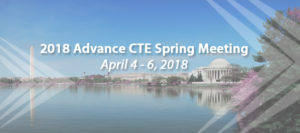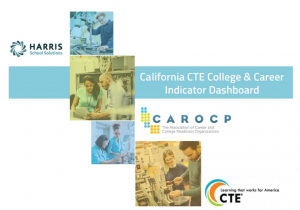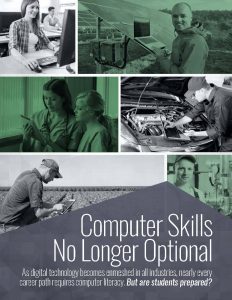This post is written by Microsoft, a Diamond Level sponsor of the 2018 Advance CTE Spring Meeting.
Technology skills requirements are rapidly changing in the workforce.  Skills and learning including technology skills that used to be important for a narrow band of students pursuing computer science or technology curriculum are now priorities across the education spectrum. Jobs require increasing technical skills across all sectors from health care to banking to marketing. In fact, it’s increasingly difficult to think of a position or career that is not touched in some way by technology.
Skills and learning including technology skills that used to be important for a narrow band of students pursuing computer science or technology curriculum are now priorities across the education spectrum. Jobs require increasing technical skills across all sectors from health care to banking to marketing. In fact, it’s increasingly difficult to think of a position or career that is not touched in some way by technology.
Meanwhile, today’s global youth unemployment rate is 13.1% and rising. 50% of today’s jobs require depth technology skills and this is predicted to increase to more than 77% in less than a decade. According to an IT labor shortage report, there will be 6.2 million new IT jobs by 2022, most in cloud-related fields. We also know that 71% of jobs classified as STEM (Science, Technology, Engineering and Math) related are in computing fields or the “T” in STEM. Yet, only 8% of graduates are enrolled in the relevant Computer Science programs in universities. And it’s a challenge that starts earlier and raises a good question as to how Microsoft and others in the industry can collaborate with educators and government leaders in the US and globally to help equip younger learners (and educators) in K-12 with resources to help fill the future pipeline for technical skills.
Microsoft is committed to making this space of technical and employability skills education in schools a priority across the US and in markets around the globe. A key part of that focus is collaboration and alliance with the mission of Career and Technical Education (CTE) in the US and represented in multiple, ongoing partnerships Microsoft has formed with state leaders and CTE programs across the country.
Microsoft’s hallmark Imagine Academy skills program is designed as a partnership opportunity with K-12 high schools as well as middle schools to help deliver meaningful, relevant and valuable skills-based learning programs with outcomes of Economic Development, Entrepreneurship and Employability – factors relevant to governors and policy-makers in states and communities across the US. With schools engaging for the employability skills priority in all 50 states, Washington, DC, and Puerto Rico,
Microsoft and its certification partner Certiport, a Pearson VUE Business, are focused on a highly impactful formula for institutions, educators and students to incorporate both the latest technology skills curriculum and industry validation leading to skills for success and career preparation for students
A key focus of the Microsoft Imagine Academy program is also on state and school leaders looking to transition their education systems to meet the demands of an increasingly competitive global economy. A critical part of that digital transformation in schools is preparing teachers for technology and innovation adoption in the classroom. Microsoft Imagine Academy designed with student outcomes in mind and also built to provide educators the resources they need to bring practical, applied technical learning to the classroom and blended learning experiences globally.
Microsoft Imagine Academy provides industry aligned curricula and certifications to train and validate students and educators competencies for high-demand technologies .The program focus is on four in-demand learning and career pathways of study: Computer Science, Data Science, IT Infrastructure, and Productivity.
 Program courses are available online and can be used for classroom instruction, blended learning and self-paced learning. Each school membership includes access to more than 150 cloud and classroom-based courses for students, staff and educators and helps prepare learners for Microsoft’s globally recognized industry certifications:
Program courses are available online and can be used for classroom instruction, blended learning and self-paced learning. Each school membership includes access to more than 150 cloud and classroom-based courses for students, staff and educators and helps prepare learners for Microsoft’s globally recognized industry certifications:
- Microsoft Office Specialist (MOS)
- Microsoft Technology Associate (MTA)
- Microsoft Certified Professional (MCP)
- Microsoft Certified Educator (MCE)
Today’s Imagine Academy is utilized in more than 16,000 academic institutions around the world, reaches 8.5 million students and educators annually, and last school year helped deliver 2.3M certification exams in academic institutions around the world.
Thank you to the many state CTE leadership teams Microsoft is already collaborating with for success. Through alliances with state leaders and the energized support of CTE programs nationally, thousands of students each year are participating in the premier Microsoft Office Specialist (MOS) championships competition and gaining strong preparation for future college and careers. Microsoft is proud to support the mission of CTE programs nationally and looks forward to further alliance with state leaders in helping prepare the next generation workforce for success.
“Thanks to the NCDPI’s partnership with Microsoft… teachers are improving their technology knowledge; and students are building the twenty-first century skills that will make them more marketable to future employers.” – Dr. June Atkinson, former North Carolina State Superintendent of Public Instruction



 retirements, and more than 10 times as many jobs will need to be filled during the next 10 years. This equates into abundant opportunities in a variety of welding disciplines for students looking to begin a career in the trades.
retirements, and more than 10 times as many jobs will need to be filled during the next 10 years. This equates into abundant opportunities in a variety of welding disciplines for students looking to begin a career in the trades.
 intelligently and efficiently. Students may know how to navigate Google and use a cell phone with ease, but can they format a Microsoft Excel spreadsheet? Can they use Adobe Photoshop to cut out an unintended passerby in a photo? Knowing how to use basic, ubiquitous technology tools is essential for academic and workplace success.
intelligently and efficiently. Students may know how to navigate Google and use a cell phone with ease, but can they format a Microsoft Excel spreadsheet? Can they use Adobe Photoshop to cut out an unintended passerby in a photo? Knowing how to use basic, ubiquitous technology tools is essential for academic and workplace success.
 year’s graduates to really be ‘college and career ready?’” To answer that question, we first must decide what, exactly, that phrase really means.
year’s graduates to really be ‘college and career ready?’” To answer that question, we first must decide what, exactly, that phrase really means. experience. Practical-skill attainment based on robust CTE Programs of Study can lead to increased student engagement. Industry credentials can be earned before a student graduates from high school.
experience. Practical-skill attainment based on robust CTE Programs of Study can lead to increased student engagement. Industry credentials can be earned before a student graduates from high school. nly happens if we, as CTE educators, commit our time, resources, and energy to ensuring “college and career ready” stands for something more than just words – we must translate it into numbers.
nly happens if we, as CTE educators, commit our time, resources, and energy to ensuring “college and career ready” stands for something more than just words – we must translate it into numbers. skills in the issue brief that will be included in your Advance CTE Spring Meeting conference bag.
skills in the issue brief that will be included in your Advance CTE Spring Meeting conference bag.